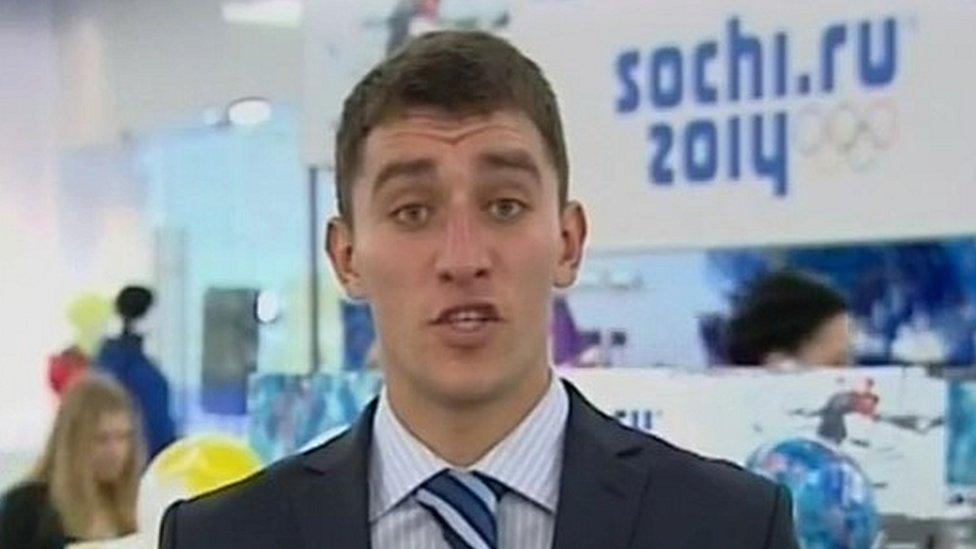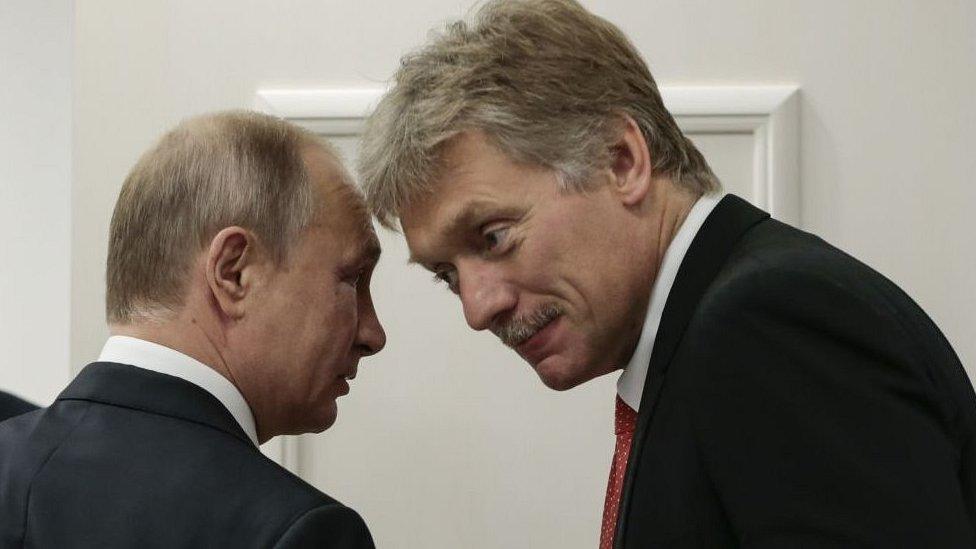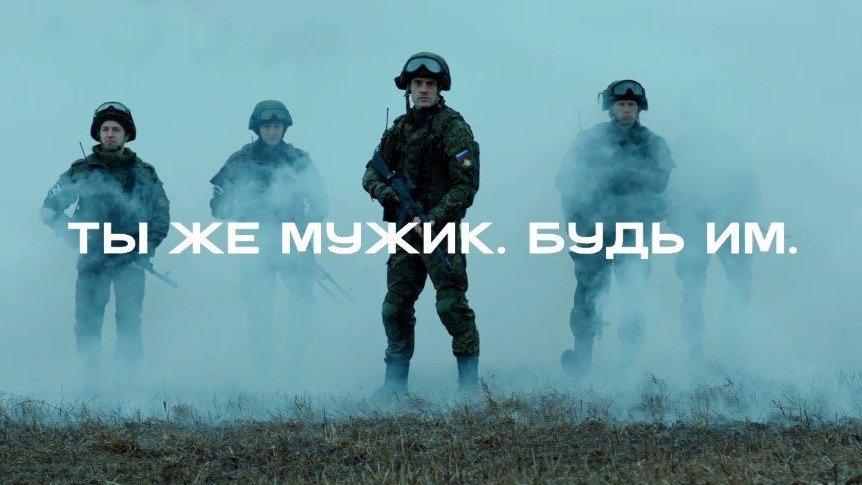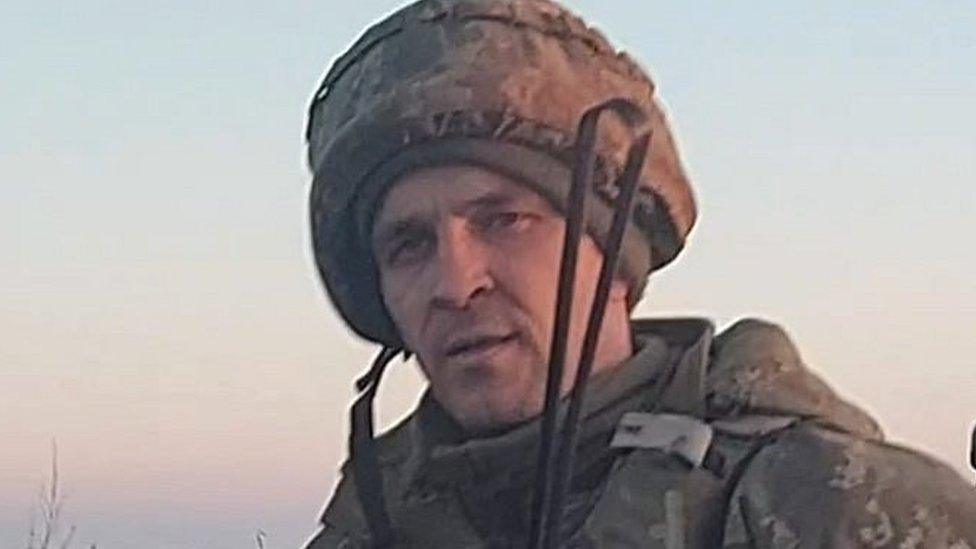Nikolai Peskov: Putin spokesman's son 'joined Wagner in Ukraine'
- Published

Nikolai Peskov also goes by the name Nikolai Choles and was previously an RT journalist
The 33-year-old son of Kremlin spokesman Dmitry Peskov says he served with the notorious Wagner mercenary group in Ukraine for nearly six months.
Nikolai Peskov said "it was my duty... I couldn't sit to one side watching as friends and others went off there."
His father confirmed this - but refused to provide any more details, Russia's RBK website said.
But a number of social media users in Russia cast doubt on whether Nikolai Peskov actually fought in the war.
The BBC was unable to verify Nikolai Peskov's claim about serving with Wagner, whose troops have been engaged in intense fighting for months in Ukraine's eastern town of Bakhmut.
Wagner is called a "private military company" in Russia and now has international notoriety for alleged war crimes and other abuses in Ukraine.
It has recruited thousands of convicts from prisons after taking heavy losses.
It is rare for a member of the Russian elite to choose to join the group - many have gone abroad to avoid conscription into the regular army.
Nikolai Peskov is also known as Nikolai Choles, and speaks fluent English, having spent several years as a youth in London. He has worked as a correspondent for Russian state broadcaster RT.
Both he and his father are under US sanctions.
In an interview with the pro-Kremlin daily Komsomolskaya Pravda, he said it was his own decision to join Wagner, but he did not know how to do it, "so I had to turn to my dad... and he helped me with that".
He said he used a false ID so that his Wagner comrades would not learn of his Kremlin connections. He did not reveal that assumed name in the interview because, he said, he might need to use it again.
Nikolai Peskov's claim coincides with a major new army recruitment drive, with Russian state ads urging men to do their "patriotic duty" in the Ukraine war.
Tens of thousands of men fled Russia last September to avoid being conscripted, after President Vladimir Putin announced a "partial mobilisation".
Nikolai Peskov did not reveal where exactly he had served in what Russia calls its "special military operation" in Ukraine.
In comments to the Russian media, Wagner chief Yevgeny Prigozhin did however give more details.
After joining the group with fake documents, he said, Mr Peskov's son underwent a three-week training course.
"After that, when he left for Luhansk, it was necessary to expand the combined artillery battalion, and he was sent to join an Uragan [multiple rocket launcher] crew," Mr Prigozhin said, adding that he "showed courage and heroism, just like all the others".
According to Mr Prigozhin, Dmitry Peskov had asked him to "take [Nikolai] on as a simple artilleryman".

Dmitry Peskov is President Putin's long-serving spokesman
Nikolai Peskov said he received a medal for bravery this year after "all of my team accomplished a feat... We had one interesting sortie - I can't say more than that."
On Monday, Dmitry Peskov was quoted by RBK as saying that his son indeed "took part in the special military operation" - the term used by Moscow to describe President Putin's full-scale invasion of Ukraine launched in February 2022.
He added that he did not want to say anything else on the issue, as "it has nothing to do with my work".
But some in Russia are openly questioning whether he actually fought in Ukraine.
The VChK-OGPU Telegram channel is quoting eyewitnesses as saying Nikolai Peskov's favourite Tesla car, which he usually drives himself, was seen "actively" moving around Moscow - and even collecting fines - during the period which he claimed to have served in Wagner.
The channel also says that unnamed Wagner artillerists have told it he was nowhere to be seen in the Bakhmut area.
Last September, Nikolai Peskov was targeted by a prank live on YouTube, in which he appeared reluctant to join the army.
Journalist Dmitry Nizovtsev, an associate of jailed Russian opposition leader Alexei Navalny, posed as a military recruitment officer in a phone call to Nikolai Peskov. Speaking in an aggressive tone, Nizovtsev asked him why he had not shown up at a Moscow call-up centre.
Nikolai replied nervously, reminding Nizovtsev that "I am Mr Peskov".
"I'm going to take this matter to another level," he said. "I basically need to know what's going on and what my rights are."
Mr Prigozhin and some Russian military bloggers have been very critical of Russian generals in Ukraine, accusing them of blunders and under-equipping Wagner. Mr Prigozhin also accused military officials of not recognising his group's sacrifices.
But last month President Putin outlawed public criticism of Wagner or the regular armed forces. The penalties for "discrediting" any part of the Russian military include prison terms of up to seven years.
Related topics
- Published21 April 2023

- Published22 April 2023
